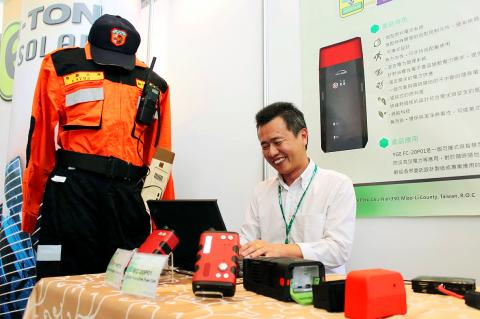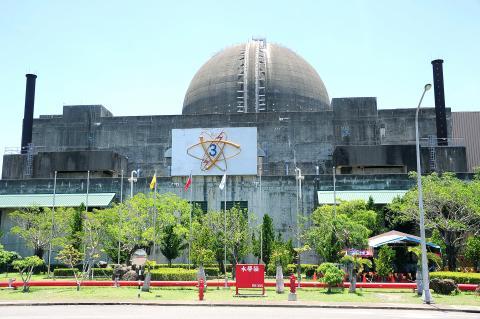The nation’s Industrial Technology Research Institute (ITRI) on Friday unveiled a portable fuel cell that is believed to be the first in the world to use solid-state hydrogen.
The device combines solid-state hydrogen fuel, water and a catalyst in a bottle the size of a beverage can, and it can generate sufficient electricity to power laptops and LED lights, the researchers said, demonstrating the product at a news conference held at an ITRI research park in Tainan.
A fuel cartridge containing sodium borohydride is inserted into a small generator that weighs about 1kg and a chemical reaction takes place that produces hydrogen, they explained. The gas is then released back into the cartridge and generates power through the fuel cell in the cartridge, they added.

Photo: Lin Meng-ting, Taipei Times
“We store hydrogen in tablet form to make it more convenient to carry the fuel around, more user-friendly. We are the only facility in the world to successfully convert solid-state hydrogen into fuel,” said Ku Jie-ren, director of the institute’s New Energy Technology Division.
A cartridge can produce 20 watts, which is enough to charge five to seven cellphones or three or four laptops, the research team said. Any electronic product with a USB socket can use the device, it added.
The device, which took nearly five years to develop, is suitable for use in remote mountainous areas or after disasters, when power-charging opportunities are limited, the researchers said.
It would be especially useful during war time since the process is completely silent, the developers said, adding that one country’s armed forces have already shown interest in the invention.
The institute has commissioned a local manufacturer to begin mass producing the product later this month. The company also plans to raise the power generated by one cartridge to 40 watts.
The ultimate goal is to apply the technology in the automobile industry, Ku said.

A fugitive in a suspected cosmetic surgery fraud case today returned to Taiwan from Canada, after being wanted for six years. Internet celebrity Su Chen-tuan (蘇陳端), known as Lady Nai Nai (貴婦奈奈), and her former boyfriend, plastic surgeon Paul Huang (黃博健), allegedly defrauded clients and friends of about NT$1 billion (US$30.66 million). Su was put on a wanted list in 2019 when she lived in Toronto, Canada, after failing to respond to subpoenas and arrest warrants from the Taipei District Prosecutors’ Office. Su arrived at Taiwan Taoyuan International Airport at 5am today on an EVA Air flight accompanied by a

An essay competition jointly organized by a local writing society and a publisher affiliated with the Chinese Communist Party (CCP) might have contravened the Act Governing Relations Between the People of the Taiwan Area and the Mainland Area (臺灣地區與大陸地區人民關係條例), the Mainland Affairs Council (MAC) said on Thursday. “In this case, the partner organization is clearly an agency under the CCP’s Fujian Provincial Committee,” MAC Deputy Minister and spokesperson Liang Wen-chieh (梁文傑) said at a news briefing in Taipei. “It also involves bringing Taiwanese students to China with all-expenses-paid arrangements to attend award ceremonies and camps,” Liang said. Those two “characteristics” are typically sufficient

A magnitude 5.9 earthquake that struck about 33km off the coast of Hualien City was the "main shock" in a series of quakes in the area, with aftershocks expected over the next three days, the Central Weather Administration (CWA) said yesterday. Prior to the magnitude 5.9 quake shaking most of Taiwan at 6:53pm yesterday, six other earthquakes stronger than a magnitude of 4, starting with a magnitude 5.5 quake at 6:09pm, occurred in the area. CWA Seismological Center Director Wu Chien-fu (吳健富) confirmed that the quakes were all part of the same series and that the magnitude 5.5 temblor was

Restarting the No. 2 reactor at the Ma-anshan Nuclear Power Plant would take up to 18 months, Minister of Economic Affairs J.W. Kuo (郭智輝) said today. Kuo was answering questions during a meeting of the Legislative Yuan’s Economics Committee, where legislators are considering amendments to the Renewable Energy Development Act (再生能源發展條) amid concerns about the consequences of the Pingtung County reactor’s decommissioning scheduled for May 17. Its decommissioning is to mark the end of Taiwan’s nuclear power production. However, Chinese Nationalist Party (KMT) lawmakers have proposed an amendment to the Nuclear Reactor Facilities Regulation Act (核子反應器設施管制法) that would extend the life of existing